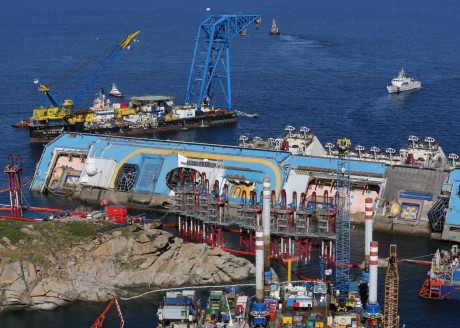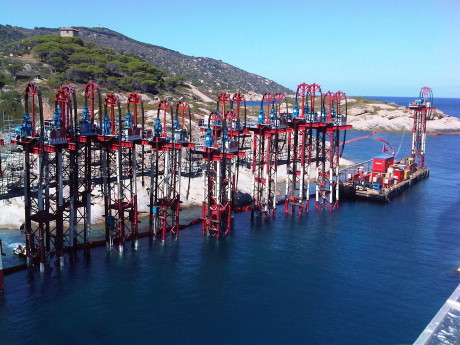In over half century of history, Fagioli Group has constantly evolved, developing engineering skills and multi-disciplinary attitudes that have enabled it to accomplish and to take part in enterprises unique of their kind. One of them concerns also the recovery of Costa Concordia, giant featuring 300 metres and 114,000 t of tonnage.
Renowned worldwide for its great logistic capacity, for exceptional transports and the handling and lifting of components with enormous sizes and weight, Fagioli Group represents a concrete example of made-in-Italy excellence, able to satisfy all types of needs in terms of engineering and handling all over the world. From the transport of Toti submarine from the Cremona harbour to the heart of Milan (inside the Science and Technique Museum), to the delicate operation of junction of the two parts of the new Italian aircraft carrier Cavour, up to the most recent launching of a ship weighing over 7,000 tons (a record for the Mediterranean area in terms of used axes, 300). Without forgetting the precious contribution and the commitment lavished in the extraordinary intervention of safety measures and recovery of Costa Concordia: liner featuring 300 metres and 114,000 t of tonnage.
The Emilia Group, with headquarters at Sant’Ilario d’Enz

a (Reggio Emilia, Italy), is in fact involved in the highest levels of the massive operation in which take part over 500 operators belonging to around twenty different nations.
«Commitment – specifies Andrea Massera, director of Fagioli engineering– already started the day after the dramatic 13th January 2012, when this sad event took place. Due to the entity of the involved means, since the beginning the aim was to understand how our engineering and the know-how gained in so many critical operations could offer a valid operational contribution ».
In the successive weeks, several realities were involved in the development of a feasible recovery project until when, on 21st April of the same year, Costa Crociere officialised the result of the tender for the removal of the wreck. The winner is the Italian-American consortium formed by the American Titan Salvage and by the Italian Micoperi, together with a pool of about forty companies (over 80% of them are Italian), including also Fagioli.
Established in 1955 by Giovanni Fagioli and today managed by his son Alessandro, the company has played, and still plays, a fundamental role in the delicate Concordia project, with a team composed by around fifty people coordinated by the general manager Moreno Massetti, by the engineering director Andrea Massera and by Paolo Cremonini, engineer, director of the operations of the Group and present among the 12 components of the supervision team in the “Control Room” positioned in front of the Concordia bow (connected with it by a double cable for the control transmission) where Nick Sloane (Master Salvage of the Titan Micoperi consortium) managed the epic Parbuckling phase.
From the anchorage to the re-buoyancy
«Several are – further specifies Massera – the main phase s that have characterized the operation, anyway not ended, yet: the wreck safety measures; its stabilization with anchorage to submarine foundations; the preparation of the false seabed where to lay the wreck after its rotation; the installation of flotation caissons on the left side of the wreck; the parbuckling, that’s to say the wreck rotation to bring it back to its vertical position; the positioning and the installation of floating caissons on the right side. Phase, the latter, not completed, yet, through which it will be attained the re-buoyancy and the successive sheltering by a harbour for the dismantling ».

Fagioli has operated in the forefront with its Engineering, Resources and Operations contributing to the development and the execution of this project in all of its phases, starting from the method definition. The parbuckling operation, carried out on September 16th and 17th, represented the most complex and exciting phase until now, restoring the vertical position of the wreck after a 65 degree rotation through a handling system performed by 36 hydraulic jacks with rope recovery, positioned on the top of the caissons fixed to the emerged side of the hull by steel cables. Each jack was connected with underwater platforms and used to retrieve the draught of steel cables, exerting an adequate force.
Protagonists were then also the numerous computerized hydraulic jacks (sea side to favour the motion) and the 11 lift towers (earth side for holding).
«The jacks – adds Mr Cremonini – were used to tighten the cables fixed to the top of the central caissons and to the platforms on which rests the wreck after its parbuckling: the maximum straightening force that Fagioli system was potentially able to exert for the wreck rotation reached a value of 13,800 t ».
Fagioli can boast the availability of a range of jacks with a capacity from 15 to 750 t, each of them equipped with lifting cables composed by strands with 18 mm diameter that go from 1 up to the number of 50 (in its turn each strand is composed by 7 cables wound together in a spiral shape). Hydraulically operated, the jacks can be used one by one, in pair, or in groups to obtain an unlimited lifting capacity.
«To manage, to operate and to control the jacks – adds Mr Cremonini – we used some power packs, hydraulic transmission motors ».
The Emilia company operates with a fleet of means equipped with hydraulic transmission motors purposely designed and manufactured, powered electrically or by diesel.
Provided with direct control and monitoring systems, these motors allow a further electronic monitoring able to visualize the number of lifting strokes, besides the positions at each seizure.
«Similar control and monitoring– specifies Mr Cremonini – can also be remotely positioned from the power supply group thanks to fully computerized systems, including the automatic lifting and capacity lowering».
Called to perform a lifting action, the lift towers implemented by Fagioli are developed to face the considerable increase of weights to be managed. A typical example is composed by a system of 4 towers without tie rods with maximum height of 120 m, and a lifting capacity up to 3,000 t.
«In particular – specifies Mr Cremonini – the towers used in the Concordia project are 11 in all, each of them provided with two hydraulic jacks with 600t capacity each. Each jack was connected by its own cable to a chain passing under the hull and fixed to the left side of the wreck. The function of the jacks consisted in pulling, and then in recovering and shortening the cable, tightening the chain and thus exerting a force on the wreck to avoid its sliding towards deeper waters: the system composed like that can exert a maximum holding and stabilization force of the wreck up to 13200 t».
Fagioli is also committed to the whole logistic part of the project and in particular to the transport of the underwater platforms and to the handling, rotation and transport of the 30 caissons exploited for the straightening and that will serve for the re-buoyancy of the ship.

«By means of a pneumatic system – ends Mr Cremonini – the caissons positioned on the two sides of the ship will be progressively emptied of the water and will provide the necessary thrust to make the Concordia re-float again, while the part that will remain submerged will be by about 18 metres. Last step before the sheltering and successive dismantling. In particular, the caissons, installed on the left side of the wreck are connected with it by welds, while those on the right are connected with the wreck by means of 92 Strand Jacks of great power by Fagioli, which transmit the re-buoyancy force of the caissons to the wreck through the operation of 92 bundles of cables, for a total force of 48,000 t ».
Know-how, then, but also made-in-Italy expertise and technology for a project unique in the world, which completes the many others already accomplished by the Emilia Group, always ready to accept new and stimulating challenges.
A success that speaks (also) Italian
Around forty companies committed to the operation of recovery of Costa Concordia, 80% of which Italian. A pool of excellence and skilled workers where stands out the contribution by the Emilia Fagioli, committed on more fronts.
«The safety measures and the straightening operation of Costa Concordia – highlights Moreno Massetti, general manager of the Emilia Group – has involved our engineering team, our equipment and our personnel, with a detailed study of the whole project ».
Massetti does not hide his pride and satisfaction with what done and what is still in course: «Despite the uniqueness of the operation – adds – our contribution has treasured the specialization gained in time by our work team, always ready to accept the most complex challenges, unique of their kind ».

About fifty people by Fagioli are committed to it, including technicians, operators and logistics players while about fifteen are working on the engineering.
«Just on this project – ends Massetti – there were fifteen thinking heads in the engineering department, some of which of young people who have just left our University ».
A success that speaks (also) Italian, but with a global farsightedness, in line with the Emilia company’s motto: “the world…our passion”, because it is in the world that Fagioli is recognized and held in high esteem.
In a video lasting 90 seconds the 19 hours of the parbuckling operation:
All video and photographic contents are made available by courtesy of the partners Costa Crociere, Titan Micoperi and La Sapienza University in Rome.



